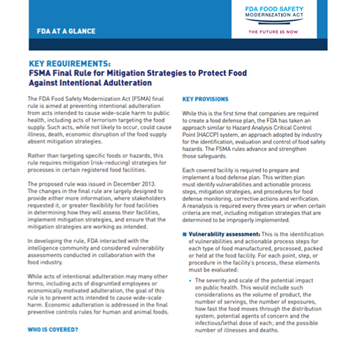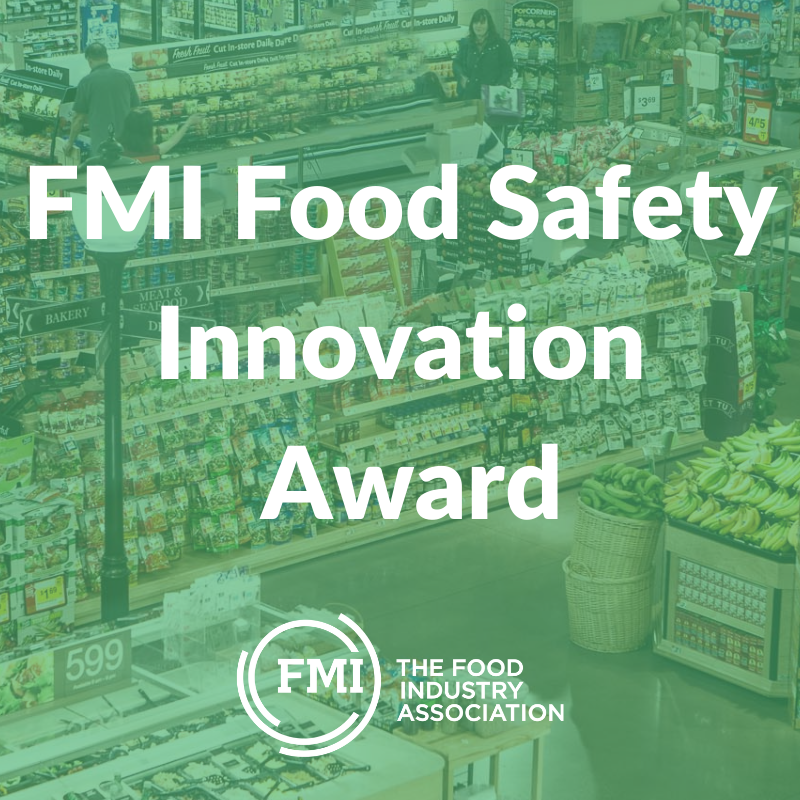By: Hilary Thesmar, PhD, RD, CFS, Chief Food and Product Safety Officer, SVP Food Safety, Food Marketing Institute
 The FDA’s Intentional Adulteration (IA) rule is one of the seven major rules under the Food Safety Modernization Act (FSMA). The IA rule is intended to protect public health by preventing intentional adulteration from acts that are intended to cause wide-scale harm, including acts of terrorism targeting the food supply.
The FDA’s Intentional Adulteration (IA) rule is one of the seven major rules under the Food Safety Modernization Act (FSMA). The IA rule is intended to protect public health by preventing intentional adulteration from acts that are intended to cause wide-scale harm, including acts of terrorism targeting the food supply.
Who is required to comply with the rule?
In general, companies who manufacture, process, pack and hold food and are required to be registered food facilities with the FDA, including both domestic and foreign food facilities, are subject to the IA rule. There are several exemptions based on size and/or operations one of which is relevant to retailers and wholesalers. Holding facilities (warehouses and distribution centers) are exempt from compliance unless they are processing in some way or have bulk liquid holding. Even though warehouses and retail distribution centers might not have to comply with the FDA IA rule, FMI recommends that all companies have food defense plans in place to reduce the risk of intentional harm.
The rule requires that each covered facility have a written Food Defense Plan in place. The plan must include:
- A written vulnerability assessment to identify significant vulnerabilities and actionable process steps along with explanations as to why each point, step, or procedure was or was not identified as an actionable process step;
- Written mitigation strategies including explanations;
- Written procedures for monitoring and implementation of the mitigation strategies; and,
- Written procedures in place for corrective actions and verification.
Some other key requirements of the final rule include training requirements for certain personnel, recordkeeping and conducting a reanalysis of the food defense plan at least every 3 years.
The final rule and guidance document includes additional details and requirements of the IA Rule and how to comply with it.
Training
Training developed for the IA rule differs from the other FSMA trainings and is modular. The various training modules are designed based on job responsibility related to preventing intentional adulteration. Employees don’t need to take all the trainings offered by FSPCA but are required to have the education, training or experience necessary to perform activities within the IA rule, as appropriate to an employee’s assigned duties.
A total of six courses are available from FSPCA:
- Overview of the IA Rule is a general introduction to the IA rule requirements.
- Food Defense Awareness training is free and is for workers and supervisors at Actionable Process Steps. The awareness training fulfills the requirements of §121.4(b)(2)
- Conducting Vulnerability Assessments using Key Activity Types is for professionals who conduct vulnerability assessments using the Key Activity Type method and is a prerequisite to taking the face to face course on Conducting Vulnerability Assessments.
- Identification and Explanation of Mitigation Strategies is for food professionals who identify Mitigation Strategies to implement at Actionable Process Steps.
- Conducting Vulnerability Assessments is a one-day face to face course for food professionals conducting vulnerability assessments using the 3 fundamental elements method. Compliance may also be achieved by using the Key Activity Types method (number 3 above.)
- Food Defense Plan Preparation and Reanalysis is for professionals who prepare food defense plans and conduct reanalysis activities. This course is expected to be available in Late Summer 2019.
Compliance and Enforcement Dates
The compliance date for large companies (over $10 million in sales and more than 500 employees) is July 26, 2019. It is expected that companies have completed the requirements for the rule by the respective compliance date, but FDA has announced that routine inspections will begin in March of 2020.
Resources
- IA Final Rule
- Guidance is available to assist with compliance
- Mitigation Strategies Database
- FDA Food Defense Plan Builder
- FMI FSMA Resource Center
Photo Source: https://www.fda.gov/downloads/Food/GuidanceRegulation/FSMA/UCM503566.pdf


 Industry Topics address your specific area of expertise with resources, reports, events and more.
Industry Topics address your specific area of expertise with resources, reports, events and more.
 Our Research covers consumer behavior and retail operation benchmarks so you can make informed business decisions.
Our Research covers consumer behavior and retail operation benchmarks so you can make informed business decisions.
 Events and Education including online and in-person help you advance your food retail career.
Events and Education including online and in-person help you advance your food retail career.
 Food Safety training, resources and guidance that help you create a company food safety culture.
Food Safety training, resources and guidance that help you create a company food safety culture.
 Government Affairs work — federal and state — on the latest food industry policy, regulatory and legislative issues.
Government Affairs work — federal and state — on the latest food industry policy, regulatory and legislative issues.
 Get Involved. From industry awards to newsletters and committees, these resources help you take advantage of your membership.
Get Involved. From industry awards to newsletters and committees, these resources help you take advantage of your membership.
 Best practices, guidance documents, infographics, signage and more for the food industry on the COVID-19 pandemic.
Best practices, guidance documents, infographics, signage and more for the food industry on the COVID-19 pandemic.
